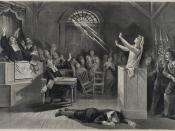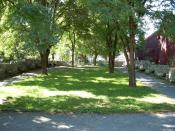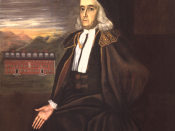Certainly one of the most prominent literary works of the mid-20th century is Arthur Miller's drama "The Crucible". On the outside it is a play in which private disputes erupt into enormous conflicts that affect the entire community. This much is obvious. At the heart and soul of the play, however, lies so much more. Because the characters' conflicts draw such an emotional response from the reader, an important element like the setting might go unnoticed. In reality the setting has much more bearing on the play than one might suppose. The Crucible certainly could not survive without its 17th century, New England setting, where the Puritan lifestyle was the normal. Not only is the play affected by its setting, it is also heavily influenced by events that were happening at the time at which the play was written, which was 1953. Arthur Miller uses the events related to McCarthyism to influence him in his writing the play "The Crucible".
The episodes involving the Red Scare and Joseph McCarthy are extremely analogous to the witch hunt in Salem, Massachusetts. It is quite obvious that there exists a parallel between the Salem witch trials of the late 17th century to Joseph McCarthy and his accusations of the mid-20th century. The entire play, the childish disputes among prominent landowners, the lies and false testimonies that are given in every act, the heroic actions of John Proctor in the final act, everything can be attributed to two overlooked sources: the play's setting and McCarthyism.
As previously stated, "The Crucible" takes place in the final decade of the 17th century in Puritanical Salem, Massachusetts. To the new land of America, the Puritans brought with them the belief in witchcraft and in the resolute power of Satan. Because America was a vast, unsettled land...



Excellent
Very informative ! :D
0 out of 0 people found this comment useful.